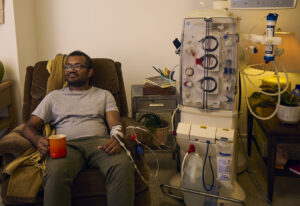Overcoming Kidney Disease with Home Hemodialysis: Kishwar’s Story

“This program has allowed me tend to my family and lead a normal life, which I don’t think I would have been able to otherwise,” says Kishwar. “It’s amazing that we have access to this life-changing service.”
In 2015, Kishwar’s life took an unexpected turn when he noticed an unusual amount of foam in his urine. This seemingly minor observation led to a life-altering diagnosis: IgA nephropathy (also known as Berger disease), an autoimmune condition that affects the kidneys. This sobering prognosis meant that within a few years, his kidneys could fail and he would require dialysis – a treatment that removes excess waste and toxins from the blood when the kidneys can no longer do so.
In 2018, after moving to Canada with his family, Kishwar was referred to Dr. Harold Borenstein at Humber River Health. It was during this time that Kishwar received the devastating news that his kidney function was rapidly declining, and he would likely need to start dialysis within the year. This was understandably difficult for Kishwar and his family to process, but the support they received from Humber River Health made a significant difference.
Initially, Kishwar was placed on peritoneal dialysis, a process that involves filtering the blood through the lining of the abdomen. However, when this treatment proved ineffective, it was recommended that Kishwar transition to hemodialysis. Hemodialysis uses a machine with a filter called a dialyzer, which acts as an artificial kidney to filter the blood.
Unfortunately, hemodialysis typically requires three clinic visits per week, with each session lasting 3-4 hours. This can be incredibly taxing on patients, leaving patients feeling exhausted and requiring strict control over diet and fluid intake. Although life-saving, this treatment can significantly impact a person’s quality of life.
Fortunately for Kishwar, Humber River Health offers a nocturnal home hemodialysis program, which was pioneered and developed by Humber’s very own, the late great Dr. Andreas Pierratos. This internationally recognized program involves a three-month training course for eligible patients and their families to learn how to perform dialysis at home. Training takes place at Humber River Health’s Church Campus, within specially designed rooms that emulate a typical home setup.
Once training is complete, equipment and supplies are delivered to the patient’s home, with the first dialysis treatment overseen by a member of the Humber team, at no cost to the patient. The patient will continue to receive support from Humber’s dialysis team throughout their treatment. Despite the lengthy training process, Kishwar was motivated by the prospect of maintaining his independence.
“My nurses kept telling me that they wanted me to go back home, to live a normal life,” says Kishwar. “If I learned how to perform hemodialysis at home, I wouldn’t have to come to the hospital three times a week. So, I swallowed my fear and gradually got used to it.”
Now, Kishwar successfully completes nocturnal hemodialysis four nights a week from the comfort of his own home. This arrangement allows him to maintain a full-time job, care for his three children (the youngest of whom was born while Kishwar was starting dialysis), and even travel. Recently, Kishwar visited Lions Camp Dorset—a unique resort that provides vacation opportunities for dialysis patients and their families. Kishwar hopes to take his family on a cross-Canada trip, with support from his Humber care team, who are currently helping to locate hemodialysis clinics along the way.
Kishwar is immensely grateful for the home hemodialysis program, stating “This program has allowed me tend to my family and lead a normal life, which I don’t think I would have been able to otherwise,” says Kishwar. “It’s amazing that we have access to this life-changing service.”
Though Kishwar is on the waiting list for a kidney donor – a process that could take five to six years – he remains positive and active. “I’m not tired at all!” says Kishwar. “Thanks to home dialysis and the training I received, the wait for a transplant is manageable.”
Kishwar is deeply thankful to Dr. Borenstein, the Humber River Health dialysis program, and the Humber’s donors whose continuous support has made all of this possible.
“If I wasn’t referred to Dr. Borenstein and introduced to the home dialysis program at Humber, I probably wouldn’t have known about this at all,” says Kishwar.
Although he lives in Bowmanville, Kishwar insists on staying with the Humber dialysis program, stating “It’s too valuable! I have to stay with it.”
Empowering Nephrology Patients: Transition Care Unit
Learning to live with kidney failure is a significant adjustment for both patients and their families. Thanks to the support of our donors, Humber continues to uphold its promise of accessible healthcare by developing programing like our Transition Care Unit, which empower nephrology patients with greater flexibility and autonomy over their treatment. To learn more, please contact Caterina Magisano at cmagisano@hrh.ca






